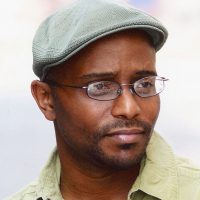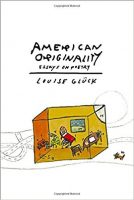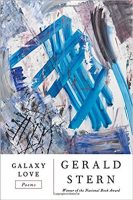April 14, 2017
Edited by David Sanders
Specimen Days
1695—Jean de La Fontaine, poet, dies.
1921—Maxwell Henley Harris, Australian poet/publisher (Gift of Blood), is born.
1939—Seamus Heaney, Irish poet and playwright (Nobel Prize in Literature 1995), is born in Castledawson, County Londonderry, Northern Ireland (d. 2013).
1942—Ataol Behramoglu Turkish poet and writer, is born.
1996—George Mackey Brown, poet, dies at 74.

The cold smell of potato mould, the squelch and slap
Of soggy peat, the curt cuts of an edge
Through living roots awaken in my head.
But I’ve no spade to follow men like them.
Between my finger and my thumb
The squat pen rests.
I’ll dig with it.
—from “Digging” by Seamus Heaney
“The cold smell of potato mould, the squelch and slap / Of soggy peat” – Seamus Heaney
World Poetry
Celebrated Palestinian Poet Ahmad Dahbour Dies at 71

Renowned Palestinian poet Ahmad Dahbour died on Saturday in the central occupied West Bank city of Ramallah at the age of 71, after long struggle against kidney failure. Secretary General of the Palestine Liberation Organization (PLO) Saeb Erekat and Palestinian Authority spokesperson Yousif al-Mahmoud both released eulogy statements for Dahbour, and sent condolences to his family and to all Palestinian people for their loss.
Belfast Poet Wins £5,000 National Poetry Competition
Out of 12,580 poems entered for this year’s award, Belfast poet Stephen Sexton’s The Curfew has been chosen as the winner of the National Poetry Competition, winning him £5,000. Judges Moniza Alvi, Gerry Cambridge and Jack Underwood selected the winning poem from entries from 73 countries worldwide – maintaining the competition’s position as one of the world’s biggest international open poetry competitions for single poems.
Renowned Palestinian poet Ahmad Dahbour died on Saturday in the central occupied West Bank city of Ramallah at the age of 71.
Recent Reviews
Out of Time
by Michael Hofmann
A poet who studied with both in Boston in the 1970s commented on the difference: “With Anne Sexton, class was drama. She was immersed in the psychological and the personal. With Elizabeth, everything was rather quiet in class, and yet she was dropping information if you were there to pick it up. Elizabeth’s and Anne’s personalities were very different. Anne was ‘let it all hang out’ and Elizabeth was ‘let’s keep it all in’”. “You know what I want, Richard?” Bishop remarked to Richard Howard, showing her fellow poet and fellow homosexual round her unfinished dockside apartment, “I want closets, closets, and more closets!” Even that, I fancy, was more literal than the pun it was sometimes hailed as being.
The Lyric Self is the Political Weapon”: Solmaz Sharif’s Look
by Eve F.W. Linn
Solmaz Sharif’s debut poetry collection, Look, takes on a project of immeasurable dimensions and violent incongruity, “a poetic rewrite of the U.S. Department’s of Defense’s Dictionary,” as she described the project in the Kenyon Review. By imposing her narrative on the excised words, by restoring language to its natural function and stripping it of its dehumanizing power, Sharif has overridden and overwritten the intended function of the dictionary—to obscure, to misuse, to misrepresent.
William Heyen Looks at Atrocities through the Lens of Poetry
by James Goodman

Ever since William Heyen wrote The Swastika Poems four decades ago, he has penned books of poems that come to grips with the horrors of Nazi Germany. "How could human beings do this to other human beings? We still don’t have the answer to this question,” said Heyen, in a recent interview at his Brockport home.
Ever since William Heyen wrote The Swastika Poems four decades ago, he has penned poems that come to grips with Nazi Germany.
Broadsides
In Memoriam Michael O’Brien
by Patrick Morrissey
“To live high, up among the cornices, from exception to exception, hearing an earthly music.” Since Michael O’Brien died on November 10, 2016, these words, from his elegy for his friend George Quinan, have been on my mind. Now that Michael is gone, they seem somehow to elegize him, too—to describe a way of life he sought in poetry, a state of heightened attention, mobile and light, on the wing yet always down-to-earth, every syllable attuned to the music. Not the poetry of extraordinary sights and elevated feeling, but rather a poetry uncannily alert to the most ordinary details: Michael’s attention could make anything exceptional.
‘A Dark and Coming Thing’: Badmind in Caribbean Literature
by Vladimir Lucien
It was Lorna Goodison’s latest book that first made me aware of our canonical Caribbean writers, in older age, speaking more candidly in their work about badmind, as a force —that the abiding malevolence of others is not merely a “social” factor, but also a cosmological one. It is there in Walcott’s reference to “my enemy’s atrabilious spite” in his poem ‘In Amsterdam’ and other references to malevolence enacted by enemies both social and cosmic in his collection White Egrets. Kamau Brathwaite’s latest book Strange Fruit looks at what he refers to as his CL: Cultural Lynching and is a fascinating look at how badmind operates and its effect on poetics and what the collection says about Brathwaite’s lifelong project to champion a Little Tradition in the face of a more settled Great tradition and the potential cosmic and social implications of such ambitions.
The Poem That Won’t Leave You Alone
by Chad Parmenter
Poems didn’t start out intriguing me intellectually, aesthetically, or in some ineffable way. They didn’t take the back of my head off or make me so cold no fire could warm me. When I was feeling godawful in high school and not knowing why, trying to aim for the normal in my life that I felt everyone else had, but missing and hitting abysses, instead I would get a hint of something almost okay in Mr. Economon’s AP English class–even though I seemed to also be flunking. It wasn’t where I wanted to find any sense of connection, because it didn’t seem at all cool, but when he passed out poems or prose excerpts for us to write about at the start of class, I found myself participating with that intense, internal resistance, as if smelling something dead. But participating.
With a Perfect Contempt
On Editing Marianne Moore
by Heather Cass White
In trying to sum up the experience of having spent the last ten years editing the poetry of Marianne Moore, most recently in the New Collected Poems, I think of a recent classroom interaction I had. Toward the end of a course on twentieth-century poetry, one of my students, clearly at the end of her patience with me, demanded to know why I kept asking them, “But what is a poem?” It’s probably a measure of how deeply I feel that question that I hadn’t noticed I’d asked it even once before she pointed it out.
“To live high, up among the cornices, from exception to exception, hearing an earthly music.” – Michael O’Brien
Drafts & Fragments
Poet Sues Insane Clowne Posse: You're No Softy, You Stole My Poem
by Tresa Baldas

Oh, no, you didn’t. That's what an Ohio man is saying to Detroit's hip-hop duo Insane Clowne Posse in a new lawsuit that claims one of its members stole his touchy-feely poem about a boy and his distant father — and passed it off as his own on YouTube. The poem is called "But You Didn't," and ICP's Violent J. didn't have the right to pretend it was his, says a copyright lawsuit filed Tuesday in U.S. District Court in Detroit, where the face-painted artist is accused of swiping a poem that was published in "Chicken Soup for the Soul."
Watch Bono's Passionate Reading of Allen Ginsberg's 'Hum Bom!' Poem
Singer and longtime Ginsberg admirer deftly tackles beat poet's tongue-twisting, Gulf War era anti-war poem
by Daniel Kreps
Bono delivered a passionate reading of Allen Ginsberg's Gulf War-era anti-war poem "Hum Bom!" in a new video for Poetry in America, Pitchfork reports. "It'll be like a tongue twister. I'll get it wrong and that's probably the point," the U2 singer warned before attempting the absurd, onomatopoeia-reliant poem that playfully details an aerial assault that's pushed Earth to the brink of doomsday.
Arts in the Parks
by Danielle Mohlman
Earth Day may be coming up, but here at My Poetic Side we don’t need a holiday to celebrate the gorgeous natural landscapes that this country offers. The sun is out and vacation is on our minds, but there’s so much inspiration to be found – inspiration that we’re eager to channel into our own poetry. Luckily the National Park Service has created an artist in residence program called Arts in the Parks, merging the beauty and solitude of these historic national parks with the unique opportunity for poets and other artists to harness the endless inspiration of nature. To celebrate this flourishing program, right below the interactive map, we’re showcasing some of Arts in the Parks’ most prolific national parks and the poets who resided there.
An Ohio man is saying Insane Clowne Posse stole his touchy-feely poem about a boy and his distant father.
Poetry In the News
'Olio' by Tyehimba Jess Wins Pulitzer for Poetry

"Olio" by Tyehimba Jess has won the Pulitzer Prize for poetry. The Pulitzer board said Monday that the work melds performance art with poetry "to explore collective memory and challenge contemporary notions of race and identity." Finalists in the category were "Collected Poems: 1950-2012" by the late Adrienne Rich and "XX" by Campbell McGrath.
Google Doodle Celebrates Beloved Russian Poet Bella Akhmadulina
Russian poet, short story writer, and translator Bella Akhmadulina was honored with a Google Doodle tribute on what would have been her 80th birthday. Born in Moscow on April 10, 1937, Akhmadulina was a star of the Russian New Wave literary movement that emerged in the 1960s and was considered one of the era's greatest poets by her contemporaries. The recipient of a panoply of prestigious awards such as the Pushkin Prize and USSR State Prize, Akhmadulina frequently recited her work to packed auditoriums and stadiums at home and abroad. Outside of the USSR, she achieved fame during the period of relaxed censorship controls known as the Khrushchev Thaw.
“Olio” by Tyehimba Jess has won the Pulitzer Prize for poetry.
New Books
American Originality: Essays on Poetry by Louise Glück
[Hardcover] Farrar, Straus and Giroux, 208 pp., $24.00

From its opening pages, American Originality forces readers to consider contemporary poetry and its demigods in radical, unconsoling, and ultimately very productive ways. Determined to wrest ample, often contradictory meaning from our current literary discourse, Glück comprehends and destabilizes notions of “narcissism” and “genius” that are unique to the American literary climate. This includes erudite analyses of the poets who have interested her throughout her own career, such as Rilke, Pinsky, Chiasson, and Dobyns, and introductions to the first books of poets like Dana Levin, Peter Streckfus, Spencer Reece, and Richard Siken. Forceful, revealing, challenging, and instructive, American Originality is a seminal critical achievement.
Odd Bloom Seen from Space by Timothy Daniel Welch
[Paperback] University Of Iowa Press, 92 pp., $21.00
These poems speak an odd nostalgia for what turns on, in, and alongside the world. A tragedy of loss, a miracle of eroticism, or a comedy of road kill, Odd Bloom Seen from Space looks at the self amid the ashes of fleeting exultation and uncertainty. The speaker tells stories with wild candor on matters of heroic inadequacy while searching through his obsessive questions for greater meaning. But it’s in the act of discovery, through the hero’s immediate ancestry that Welch’s debut collection confronts big questions about family, music, art, and memory.
Galaxy Love: Poems by Gerald Stern
[Hardcover] W. W. Norton & Company, 128 pp., $25.95

The poems in this new volume by the winner of the National Book Award span countries and centuries, reflecting on memory, aging, history, and mortality. “Hamlet Naked” traverses Manhattan in the 1960s from a Shakespeare play on 47th Street to the cellar of a Ukrainian restaurant in the East Village; “Thieves and Murderers” encompasses musings of the medieval French poet François Villon and Dwight Eisenhower; “Orson” recounts a meeting of the poet and Orson Welles, exiled in Paris. Gerald Stern recalls old cars he used to drive―“the 1950 Buick / with the small steering wheel / and the cigar lighter in the back seat”―as well as intimate portraits of his daily life “and the mussel-pooled and the heron-priested shore” of Florida. These are wistful, generous, lively love poems and elegies that capture the passage of time, the joys of a sensual life, and remembrances of the past.
When I Grow Up I Want to Be a List of Further Possibilities by Chen Chen
[Paperback] BOA Editions Ltd., 96 pp., $16.00
In this ferocious and tender debut, Chen Chen investigates inherited forms of love and family–the strained relationship between a mother and son, the cost of necessary goodbyes–all from Asian American, immigrant, and queer perspectives. Holding all accountable, this collection fully embraces the loss, grief, and abundant joy that come with charting one's own path in identity, life, and love.
The Blessing of Dark Water by Elizabeth Lyons
[Paperback] Alice James Books, 100 pp., $15.95

Lyons’s debut, The Blessing of Dark Water, highlights the exquisite pain and terrible happiness of mental illness by invoking the voice and perspective of American artist, Walter Inglis Anderson, who struggled with bipolar depression and psychotic episodes. These poems grapple with the suffering and secrecy of “invisible” illness, and the aching struggle for a simple human connection within the complexities.
American Originality forces readers to consider contemporary poetry in radical, unconsoling, and ultimately very productive ways.
Correspondences
The Rumpus Mini-Interview Project #78: Lillian-Yvonne Bertram
by Laura Wetherington

In 2016, Lillian-Yvonne Bertram’s writing won the Narrative Poetry Contest. Bertram’s work is formally and thematically expansive and this sampling, called “Facts About Deer and Other Poems,” showcases her incredible range. In the poem “They were armed with long guns”—a poem written in ten parts—the sections move between lists, plain declarations like, “You know // where this / is going. This is // America,” and Bertram’s characteristically stunning descriptions, like when she says about the slant of light in a classroom, “It is fall // and the light from these windows behaves as / you’d expect: it rushes in. It strangles.”
Forrest Gander on Editing Untranslatable Poet Yoshimasu Gozo
by lschell

Yoshimasu Gozo is a one-of-a-kind artist. While he’s usually referred to as a poet, such a categorization almost always comes with some sort of qualification. His work is often called “unconventional” or “unorthodox.” Others stress that his poetry draws heavily from performance, music, and/or multimedia art. In a word, he writes the sort of poetry that’s regularly deemed “untranslatable.” Despite the many challenges in bringing his work into English, New Directions published a new collection of translations of Gozo’s works, Alice Iris Red Horse, last fall. But to call this collection simply a work of translation feels like underselling it, and not just because there are interviews, photos, and extensive notes collected alongside the translations. There’s something unique about these translations.
Maggie Nelson Writes Books Like She’s Hosting a Party
by Maggie Lange

Maggie Nelson’s The Argonauts is a book of borrowing and sharing. She credits other thinkers generously, divulges openly, and writes so exquisitely that everyone always seems to be lending their copy to someone else (I don’t even remember who has mine). When Nelson spoke at the Brooklyn Academy of Music last week, moderator Lorin Stein said he’d given the book away so many times that he was now on his third. At the event (part of the Eat, Drink and Be Literary series) Nelson answered a strange bouquet of audience questions, many of which seemed to be excuses for the question-askers to describe how meaningful Nelson’s work had been for them.
In 2016, Lillian-Yvonne Bertram’s writing won the Narrative Poetry Contest.
Envoi: Editor’s Notes
The 2017 Pulitzer Prize in Poetry

Confession time: The story about the Pulitzer Prize in Poetry above was cut and pasted from way down the column of a longer story about the prize winners on Monday, and the headline was not the headline from the AP article.
As of Tuesday morning, there were no news articles specifically about Olio by Tyehimba Jess winning the prize. There were articles on the winners in music or drama, which is good. There were articles about the winners of the prize in journalism, of course. This is obviously not a reflection on the work of Tyehimba Jess. It could be taken, however, as a reflection on the status of poetry in the United States. So that’s how I’ll take it.
Congratulations, Mr. Jess.
As of Tuesday morning, there were no news articles specifically about Olio by Tyehimba Jess winning the prize.